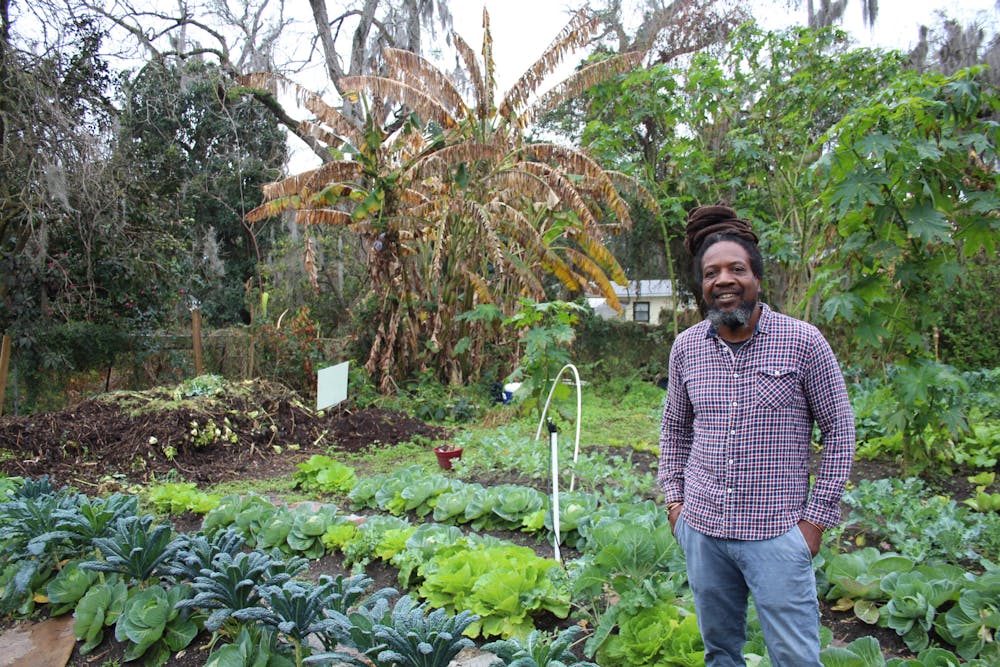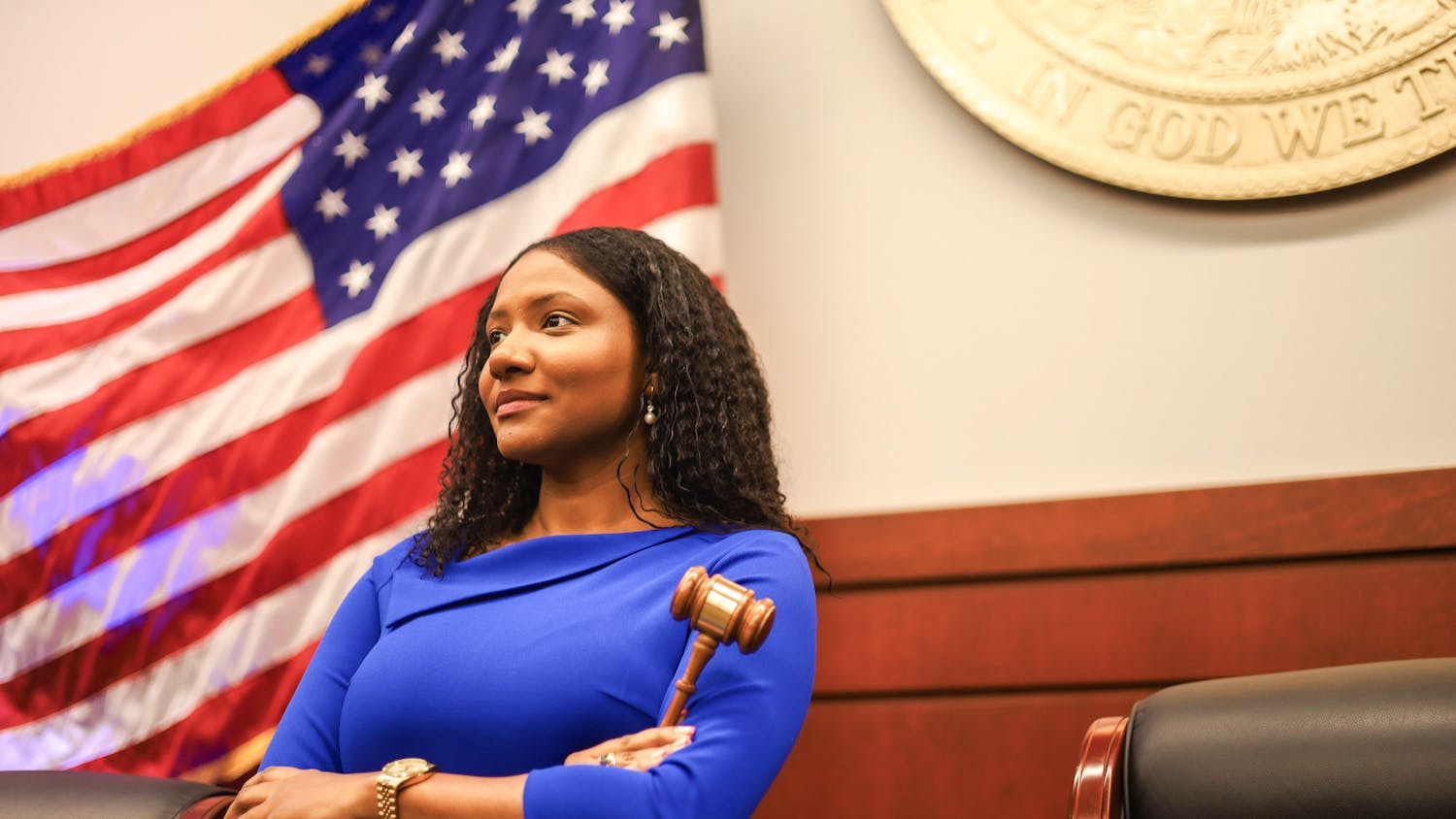In downtown Gainesville, Otis Garrison walks through the Porter’s Quarters community farm identifying vegetables. Leafy kale, waxy cabbage and tiny broccolini are among the head farmer’s more popular vegetables — along with lots of collard and mustard greens, at the request of his neighbors.
“A lot of this is like touching base with the community and getting like, ‘Hey, what would you guys eat if I grow it?’” Garrison said.
The farm, located in the historically Black Porter’s Quarters neighborhood, was founded to grow food for its community and foster self-sufficiency, he said.
In Alachua County, 11.1% of the population is food insecure, according to the Florida Department of Health. In the last decade, several urban farms have sprouted in an effort to combat local food insecurity. These community gardens also tackle other issues stemming from food insecurity, including educating citizens and addressing systemic inequality.
Community initiatives
When Meg Boria-Meyer founded the Gainesville Giving Garden in 2021, the COVID-19 pandemic had exacerbated food insecurity, she said. Many people lacked accessibility to fresh food, she said, creating a nutritional health gap in the community.
The Giving Garden grows and donates about 3,000 pounds of produce annually, which is carefully cultivated by the nonprofit’s volunteers. The garden hosts open volunteering each week, where citizens can learn the entire process of urban farming, including how to plant and harvest different crops.
“This is like another space where people are able to make friends and then also learn something along the way,” Boria-Meyer said.
The Giving Garden often has more than 50 volunteers at a time, Boria-Meyer said, ranging in age from toddlers to grandparents. Some of the volunteers the Giving Garden sees have never gardened before, she added.
Paige Ehrlich, 29, began volunteering at the Giving Garden in January as a requirement of her UF family, youth and community sciences major. Ehrlich already had an interest in studying food insecurity, she said, and found the garden’s hands-on approach to urban farming appealing.
“It’s like a whole holistic process of food from the start of the seed all the way to when it’s on your plate,” Ehrlich said. “Which a lot of people in this day and age are removed from.”
On Feb. 3, the Giving Garden partnered with other local nonprofits to host a food community tour. One of these partners, Working Food, offered a seed-saving demonstration at the local nonprofit GrowHub for the event. Working Food’s local seed bank holds hundreds of different types of seed and donates a portion to local farmers each year.
Having access to seeds can allow a community to have ownership over its food, Working Food Executive Director Shelby Dixon said. Working Food is a part of a local web of nonprofits, which work together to tackle the wider issue of food insecurity across Gainesville, Dixon said. Working Food’s role, she added, is to fight food insecurity at its source.
Besides its seed-saving initiatives, Working Food also offers youth culinary programs and rents out its commercial kitchen to small businesses. It's important that a local community is able to build its own stable food system, Dixon said, especially as grocery store prices fluctuate with inflation.
“If we’re able to take care of one another, to share the bounty with one another, that makes a huge impact as well,” Dixon added.
While many organizations are working to combat food insecurity in the Gainesville community, the problem is often more complex than just having food on the table.
Food insecurity at UF
While food insecurity is a nationally recognized issue, experts are now shifting the focus from food insecurity to nutrition insecurity, said Catherine Campbell, a UF family, youth and community sciences professor.
Food insecurity is commonly associated with a lack of income, Campbell said. However, nutrition insecurity takes other health and societal factors into account. In food deserts, or places where it’s difficult to access fresh food, the rate of diet-related illnesses such as heart disease or diabetes is higher. Even in food pantries, Campbell said, the emphasis often lies on stocking up on shelf-stable goods.
“The thinking about nutrition security is a recognition that not all calories are equal,” Campbell said.
Those vulnerable to food insecurity often don’t have access to fresh produce or nutrient-dense foods, Campbell said, making them more vulnerable to diet-related illnesses. Urban farms make produce more available to those who might not be able to access it otherwise, she added.
That goal was part of what inspired Alachua County Commissioner Anna Prizzia to start the Field & Fork program at UF. Many students — especially first-generation or international students — struggle to figure out how to pay for both tuition and the cost of living, Prizzia said.
“Being able to have the garden and provide that fresh produce as well as the shelf-stable stuff at the pantry I think makes a really big difference,” she added.
Field & Fork produces over 13,000 pounds of produce annually, most of which goes to the Hitchcock Field & Fork Pantry. The pantry is free for anyone with a valid UF ID, Prizzia said.
The farm itself is almost entirely managed by students, she added, and serves as a learning opportunity for many of them.
Racial Inequalities
During her time at UF, political science professor Sharon Austin has taught multiple students who have been food insecure. Some of those students couldn’t afford food, Austin said. Others were homeless.
Food insecurity among students isn’t an issue that’s widely recognized due to UF’s reputation of having mostly middle-class students, Austin said.
“A lot of people don’t want to believe that there are students who are homeless, or students who don’t have food,” Austin said. “But they do exist, because I’ve met them.”
Austin, who specializes in African American politics, said food insecurity often impacts rural, poorer communities more acutely, especially when those communities are historically Black. Black households experience food insecurity at three times the rate of white households, according to the USDA.
Large chains often avoid putting a supermarket in these communities, based on the perception that they won’t be successful, Austin said. This supermarket redlining often creates food deserts, she added, which adds to existing issues of systemic racism.
“It continues to perpetuate inequality because food affects everything about your life,” Austin said. “It affects your health. It affects your concentration.”
For Otis Garrison and the Porter’s Quarters community farm, education is empowerment. Garrison hosts workshops at the farm to teach residents about urban farming so that they can plant their own gardens at home. By teaching people about food deserts and urban farming, food insecurity can start to be lessened, Garrison said.
While Garrison has only been at the farm for a year, he’s already witnessed the way it creates a connection within the community. Neighbors who were once passively curious about the farm are now regulars.
Even some of the more introverted residents come out to tend the garden, Garrison said. While Garrison views the plot as something that can be used to grow food, he also sees it as a space for common ground.
“Having a space like this…it changes you,” Garrison said. “You’re affected by it whether you realize it or not.”
Contact Kylie Williams at kyliewilliams@alligator.org. Follow her on X @KylieWilliams99.
Kylie Williams is the Spring 2025 Digital Managing Editor and a third-year journalism major. She has also worked as the enterprise editor and the environmental enterprise reporter. In her free time, she can be found reading, baking or watching reality TV with her cat.






